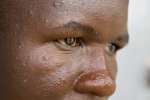Q&A: The challenges to ending displacement in Nigeria
News Stories, 19 November 2015
GENEVA, Nov 19 (UNHCR) – Violent clashes between Government forces and Boko Haram rebels in the north of Nigeria have forced millions of civilians from their homes. Some 2.2 million people have been displaced internally, while over 175,000 more have sought safety in neighbouring Cameroon, Chad and Niger. Since taking office in May, the new Nigerian Government has stepped up the counter-insurgency effort, but the humanitarian crisis shows no sign of abating. UNHCR and partner agencies have redoubled their response to the Nigeria refugee crisis in the neighbouring countries. UNHCR has also taken measures to strengthen its collaboration in the protection of internally displaced people, or IDPs, inside Nigeria. Angèle Dikongué-Atangana is the UNHCR Representative to Nigeria and the Economic Community of West African States (ECOWAS). Based in Abuja, she spoke to UNHCR global web editor Tim Gaynor during a recent visit to Geneva.
What's the current situation in Nigeria?
There has been an insurgency going on since 2009 in the north-eastern part of Nigeria. Due to the insurgency, the Government declared a state of emergency in May 2013. This came to an end in November 2014 simply because constitutionally it couldn't be taken beyond that. Now President Muhammadu Buhari has taken office and has continued the counter-insurgency.
The insurgency and counter-insurgency have now generated at least 2.2 million internally displaced people, who are mostly scattered in Borno, Adamawa and Yobe states and their neighbours. And it has generated 177,000 refugees in neighbouring Cameroon, Chad and Niger. It is not only driving displacement, it has also killed at least 20,000 people so far. Thousands of children have been abducted, especially girls, including the famous 200-plus Chibok schoolgirls, who were taken in April 2014 and who are still missing. And some of these abductees have been released.
This new Government has stepped up the fight against the insurgency. This has brought about the release of some of the abductees. These people are traumatized. They need psychosocial support. They are literally destitute. They have nothing to recover.
What is your biggest challenge?
My biggest challenge has really been to design a program and to get the means required to really respond to the needs of the IDPs and refugees – because their needs are enormous. They lack food, bedding and cooking equipment. Most of them have nothing. They flee in circumstances such that they can't take anything along with them. They reach the places that they are going barefoot and empty-handed. Some have run to health centres and schools for accommodation, so the school system has been disrupted in the whole of the north-east.
The IDPs are depending on assistance to eat. Protection issues are rampant because the insurgency and counter-insurgency are continuing. On September 11, 2015, we had an IDP camp attacked and seven IDPs killed and others injured, including aid workers.
So far since July 2015, some 17,000 people have come back from Cameroon, not counting the 13,000 who came back previously from Niger. So, we have at the same time internal displacement going up. The people returning are adding to the internal displacement because the conditions are not conducive to their sustainable return to their places of origin. The situation is really enormous. The needs are enormous. The magnitude is exceptional. Which means that no matter what means the state provides, they would still come up short. So we need to rally around the international community to come to the aid of these displaced people.
It's now mid-November and funding is running at 32 percent of your needs for this year. How will this shortfall impact your work going into 2016?
I am very concerned going into next year. The needs are there but the funding is missing. As well as protection, we are building the capacity of humanitarians and Government agencies to face the exceptional magnitude of the situation that is besieging the country. If we don't have the means, we will not be able to accommodate displaced people in decent shelters, which would mean that the schools would remain occupied, school disruptions would continue.
At the moment, more than 10 million Nigerian children are assessed to be out of the school system. This is another problem. Having a situation where we are already facing terrorism, this is a very fertile ground for continued terrorism.
Is it a problem that Nigeria can solve by itself?
We need help from the international community to assist in solving the root causes of the situation, because humanitarian assistance alone will not do it. It definitely requires an international response, as it has the potential of becoming global. These refugees seeking protection abroad have also been caught in terrorism, because terrorism has now moved to Cameroon, Chad and Niger. The whole northern part of Cameroon is inaccessible to our colleagues. These places themselves have become unsafe. So it really is a situation that requires international attention.
Where do you see this situation in a year's time?
I acknowledge the resolve by the new administration to really tackle the insurgency situation. I would like to be very optimistic, but we have to be mindful that this is a situation that has been going on for six years, and it has been left – somewhat – to fester. I feel that, if the kind of attention that it has got today had been brought four years ago, probably then we would have seen the results immediately. But now the terrorists have scattered around, they are fighting an unconventional war and so it is quite difficult to tell when we can come out of all of this. I hope that the situation will improve security-wise, but I'm really not optimistic that in a year's time we'll be out of it. But of course, we hope and pray for the best!















































